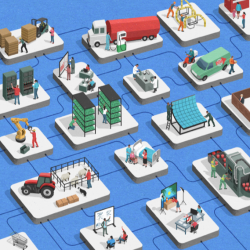May 3, 2023
Around a quarter of jobs will shift over the next five years, WEF report claims
 Almost a quarter of jobs are expected to switch in the next five years according to a new report from the World Economic Forum. Its Future of Jobs Report for 2023 suggests that employers anticipate 69 million new jobs to be created and 83 million eliminated among the 673 million jobs corresponding to the dataset, a net decrease of 14 million jobs, or 2 percent of current employment. The data is an extrapolation of data from 803 employers employing around 11 million people.
Almost a quarter of jobs are expected to switch in the next five years according to a new report from the World Economic Forum. Its Future of Jobs Report for 2023 suggests that employers anticipate 69 million new jobs to be created and 83 million eliminated among the 673 million jobs corresponding to the dataset, a net decrease of 14 million jobs, or 2 percent of current employment. The data is an extrapolation of data from 803 employers employing around 11 million people.
Macrotrends, including the green transition, ESG standards and localization of supply chains, are the leading drivers of job growth, with economic challenges including high inflation, slower economic growth and supply shortages posing the greatest threat. Advancing technology adoption and increasing digitization will cause significant labour market churn, with an overall net positive in job creation.
While technology continues to pose both challenges and opportunities to labour markets, employers expect most technologies to contribute positively to job creation.
The fastest growing roles are being driven by technology and digitalization. Big data ranks at the top among technologies seen to create jobs, with 65 percent of survey respondents expecting job growth in related roles.
The employment of data analysts and scientists, big data specialists, AI machine learning specialists and cybersecurity professionals is expected to grow on average by 30 percent by 2027. Training workers to utilize AI and big data will be prioritized by 42 percent of surveyed companies in the next five years, ranking behind analytical thinking (48 percent) and creative thinking (43 percent) in importance.
Digital commerce will lead to the largest absolute gains in jobs: approximately 2 million new digitally enabled roles are expected, such as e-commerce specialists, digital transformation specialists, and digital marketing and strategy specialists.
At the same time, the fastest declining roles are also being driven by technology and digitalization, with clerical or secretarial roles including bank tellers, cashiers and data entry clerks expected to decline fastest.
The Future of Jobs Report 2023 suggests that tasks are seen as no more automated now than they were three years ago when the report was last published. About a third of tasks (34 percent) are currently automated, just 1 percent above the 2020 figure. Surveyed companies also revised down their expectations for further automation, to 42 percent of tasks by 2027, compared to 2020 estimates of 47 percent of tasks by 2025.
But while expectations of the displacement of physical and manual work by machines has decreased, reasoning, communicating and coordinating – all traits with a comparative advantage for humans – are expected to be more automatable in the future. Artificial intelligence, a key driver of potential algorithmic displacement, is expected to be adopted by nearly 75 percent of surveyed companies and is expected to lead to high churn – with 50 percent of organizations expecting it to create job growth and 25 percent expecting it to create job losses.
Rise of green, education and agriculture jobs
Investment in the green transition and climate-change mitigation, as well as increasing consumer awareness of sustainability issues are driving industry transformation and opening new opportunities in the labour market. The strongest net job-creation effects are expected to be driven by investments that facilitate the green transition of businesses, with more than half of respondents expecting it. As countries seek more renewable energy sources, roles including renewable energy engineers and solar energy installation and systems engineers will be in high demand.
Investment will also drive growth in more generalist sustainability roles, such as sustainability specialists and environmental protection professionals, which are expected to grow by 33 percent and 34 percent respectively, translating to growth of approximately 1 million jobs.
However, the largest absolute gains in jobs will come from education and agriculture. The report finds that jobs in the education industry are expected to grow by about 10 percent, leading to 3 million additional jobs for vocational education teachers and university and higher education teachers. Jobs for agricultural professionals, especially agricultural equipment operators, graders and sorters, are expected to see a 15 percent-30 percent increase, leading to an additional 4 million jobs.
Increasing urgency for the reskilling revolution
Companies report that skills gaps and an inability to attract talent are the key barriers to transformation, showing a clear need for training and reskilling across industries. Six in 10 workers will require training before 2027 but only half of employees are seen to have access to adequate training opportunities today. At the same time, the report estimates that, on average, 44 percent of an individual worker’s skills will need to be updated.
The gap between workers’ skills and future business needs puts the onus on companies and governments to enable learning and reskilling opportunities. Government funding for skills training would help connect talent to employment, according to 45 percent of businesses surveyed.
For example, while there is continued growth in green jobs in the past four years, as indicated by additional research conducted by LinkedIn for this year’s report, reskilling and upskilling towards green skills is not keeping pace.
In response to the cost-of-living crisis, 36 percent of companies recognize that offering higher wages could help them attract talent. Yet, companies are planning to mix both investment and displacement to make their workforces more productive and cost-effective. Four in five surveyed companies plan to invest in learning and training on the job as well as automating processes in the next five years. Two thirds of companies expect to see a return on investment on skills training within a year of the investment, whether in the form of enhanced cross-role mobility, increased worker satisfaction or improved worker productivity.
Strong cognitive skills are increasingly valued by employers, reflecting the growing importance of complex problem-solving in the workplace. The most important skills for workers in 2023 are seen to be analytical thinking and creative thinking, and this is expected to remain so in the next five years. Technological literacy, and AI and big data specifically, will become more important and company’s skills strategies will focus on this in the next five years.
















